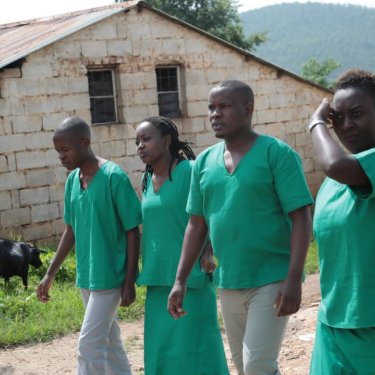Four Burundian journalists sentenced to 30 months in prison

The 30-month jail sentences that a Burundian court passed yesterday on four reporters are politically motivated and incomprehensible because the trial showed that the prosecution had no evidence to support its case, Reporters Without Borders (RSF) said.
The four journalists – Christine Kamikazi, Agnès Ndirubusa, Térence Mpozenzi and Egide Harerimana – work for Iwacu, a weekly that is one of the last bastions of independent reporting in Burundi. Held since 22 October, they were returned to their cells immediately after the trial to begin serving their sentences. Initially charged with “complicity in a violation of internal state security,” they were finally convicted on the much weaker charge of “attempted complicity in a violation of internal state security”. The court also fined each of them 1 million francs (482 euros). The court acquitted the driver who was arrested with them (who had not been placed in pre-trial detention). It also ordered that equipment seized at their time of their arrest should be returned to Iwacu.
On 30 December, the prosecution had requested 15-year jail terms for the journalists, who were arrested while trying to cover a rebel incursion into the northwest of the country. But the trial established that they had no links with the rebels. Close examination of their mobiles phones by the intelligence services showed that they had never been in contact with the rebel group.
“The conviction of these four reporters is a political punishment with the sole aim of keeping the pressure on independent journalists in the last months before the presidential election,” said Arnaud Froger, the head of RSF’s Africa desk. “The case was a complete fabrication and the journalists should have been acquitted because they were just doing their job. The sentences are incomprehensible. They should be freed immediately and unconditionally.”
RSF launched a petition for the release of the four journalists at the start of January.
Burundi has been embroiled in one of the worst crises in its history ever since President Pierre Nkurunziza’s announcement in 2015 that he was running for a third term. The ruling party has just named Gen. Evariste Ndayishimiye as its candidate for the 20 May presidential election. Journalists meanwhile continue to be subjected to intense intimidation and the authorities maintain their tight grip on the media landscape.
The BBC closed its bureau in the capital, Bujumbura, in July 2019 after failing to get the authorities to lift an order suspending its activities. The order was issued after it broadcast a TV documentary accusing the security services of operating secret torture and detention sites. An order suspending Voice of America for six months in 2018 was extended indefinitely in March 2019 and is still in effect.
Iwacu is constantly harassed by the authorities and its website is often blocked, prompting RSF to intercede. The authorities have never shed light on the fate of an Iwacu journalist, Jean Bigirirmana, who disappeared three and a half years ago after being abducted by the intelligence services. RSF continues to demand DNA analyses of two bodies that were found a few weeks after he disappeared.
Burundi is ranked 159th out of 180 countries in RSF’s 2019 World Press Freedom Index.


